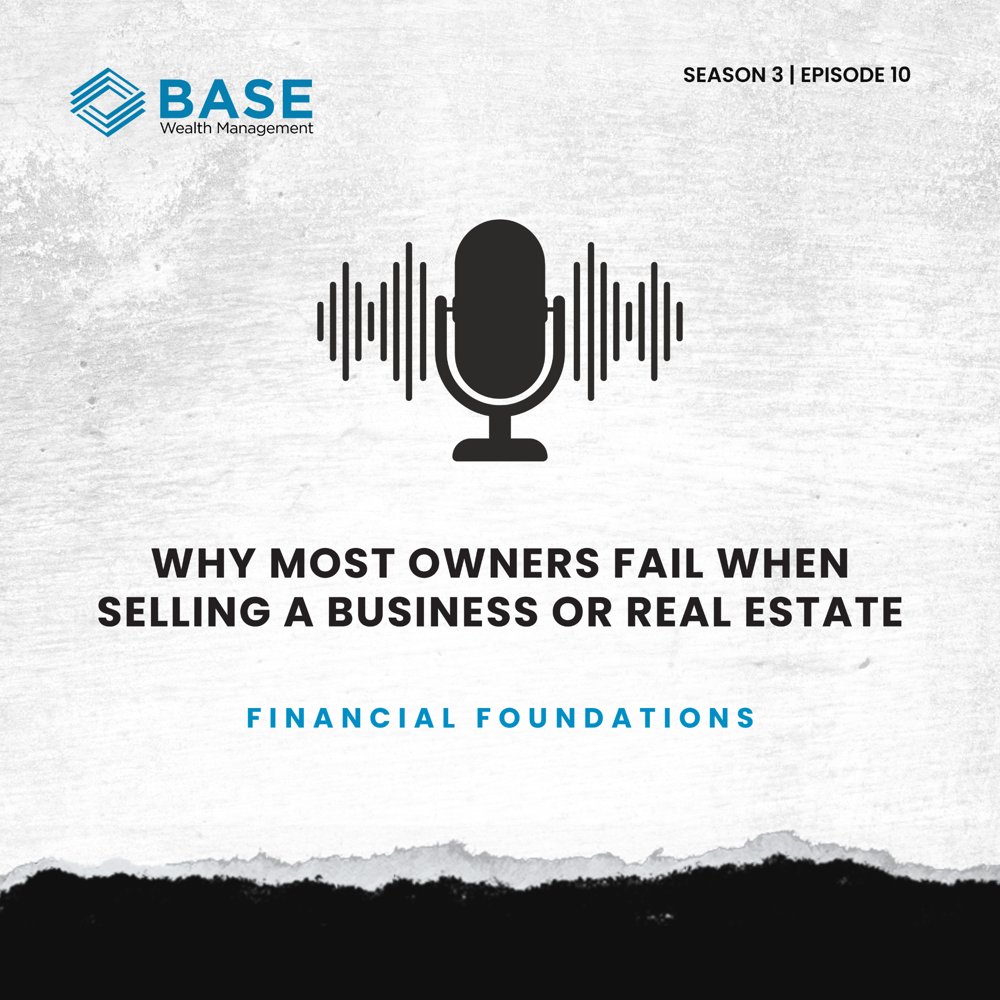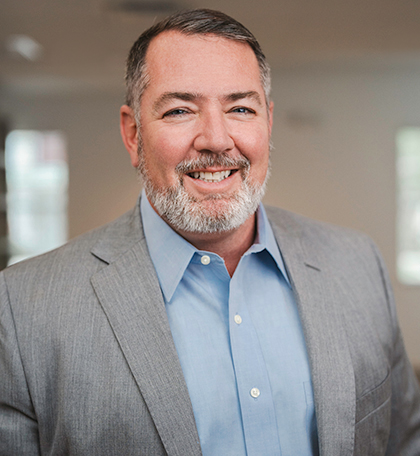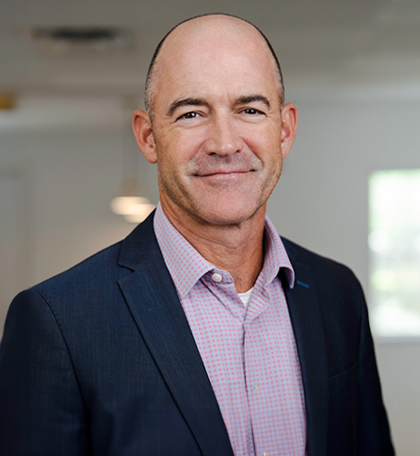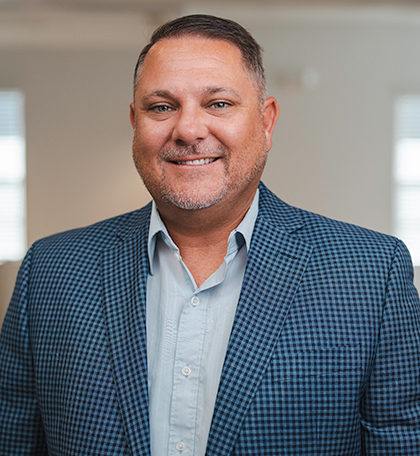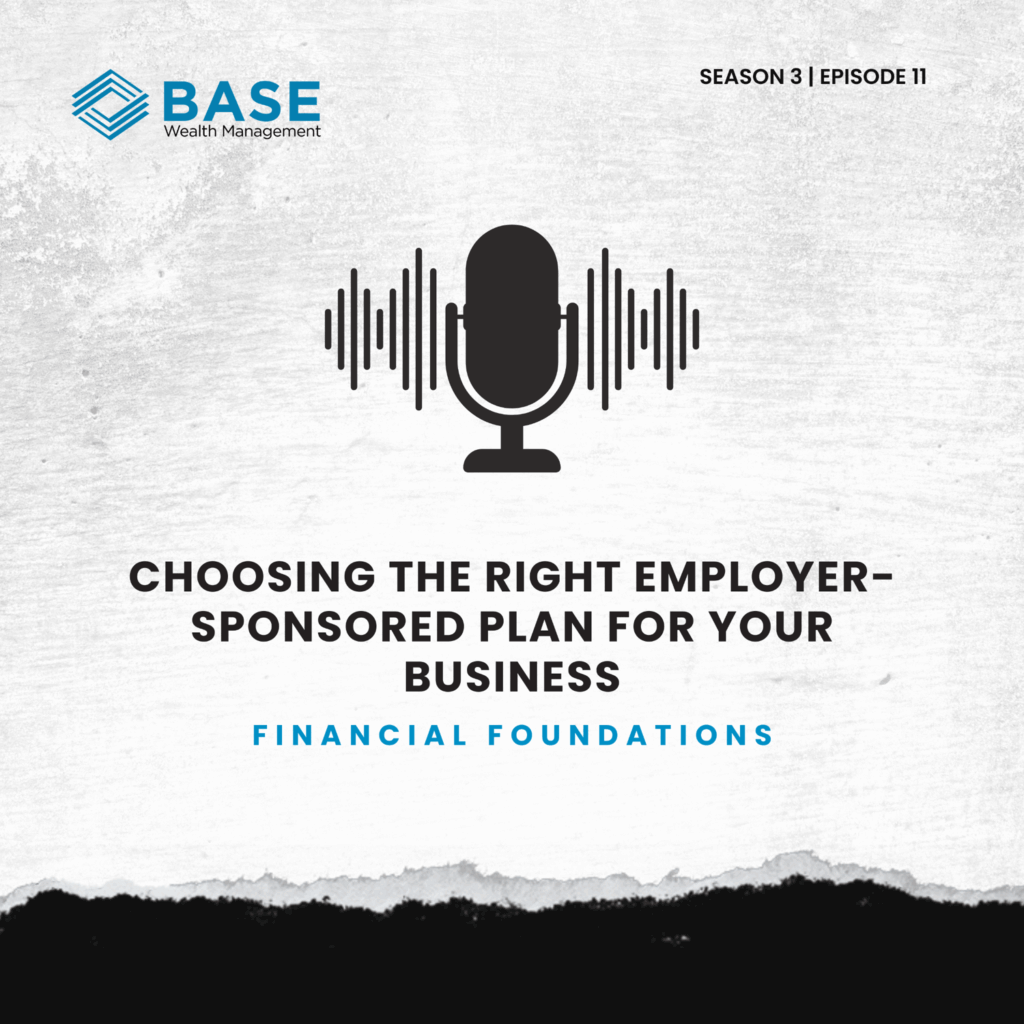
TRANSCRIPT:
Welcome to the Financial Foundations Podcast, your gateway to the fascinating realm of finance, brought to you by Base Wealth Management.
On this show, we delve deep into the world of money, guided by seasoned experts who will unravel the complexities of finance and provide you with invaluable insights and practical advice. Now, here are your hosts, Dustin Taylor and Alex Wolfe.
—
To some degree, I think that the design of our system somewhat fires a decent level of inflation for us to get out of the mess we’re in with that. Welcome to the Financial Foundations podcast, your gateway to the fascinating realm of finance, brought to you by Base Wealth Management. In this show, we delve deep into the world of money guided by seasoned experts who will unravel the complexities of finance and provide you with invaluable insights and practical advice. Now, here are your hosts, Dustin Taylor and Alex Wolfe. Welcome back to Financial Foundations, brought to you by Base Wealth Management, where we are the foundation to your financial plan. I’m your host, Dustin Taylor. I’m your co-host, Alex Wolfe, certified financial planner. And today we have with us the mortgage nerd himself, Adam Klugh. Welcome. Thanks for having me. And today we’re going to talk about mortgages and real estate. So the first question that I have for you, Adam, is tell us about the journey of you getting a degree in biology to becoming a firefighter, to getting into real estate, and then getting into mortgages. How did that happen?
Yeah, I mean, I went to undergrad for biology thinking I was going to go into some sort of medical field, but you know, you, as obviously as any 18 to 20 year old, you don’t precisely know what it is you’re going to do. Got an opportunity to join the fire department. I was a legacy. My dad was 36 years on the fire department, so it was an awesome job. I loved it. But while in my last year of college, after I had already got accepted on the fire department, I took an economics class and had a really, really good teacher. It was 2008 was the year. So, you know, what was happening at that time? And he pretty much just kind of, it was like he had a crystal ball. He spelled out exactly what was going to happen with the housing market. And after talking with them, I realized that if what he was saying was true, getting my hands on single family homes was probably the, what made more sense than, than anything, you know, but I graduated college. I didn’t have any money.
So I did listen to a lot of podcasts and learned a little bit more about economics and real estate. Eventually got on a fire department and started trying to apply to purchase a home and got laughed out of pretty much every office there when they looked at my $36,000 a year in student loans and everything else. So I ended up going online and looking up the guidelines because you can look up all of the major agency guidelines online and all of the rules were changing at this point. I mean, new regulation had hit 2009 with Dodd-Frank and a lot of mortgage lenders didn’t understand the rules either. But I found out that you can get a multi-family home and use some of the income to supplement your income. And I found out that the way that they were calculating the student loans wasn’t quite right and I was able to finally walk into a mortgage office and say, hey, I qualified. This is why. You like self-qualified yourself practically. Yep. Yep.
So I bought my first home, which was a duplex, turned it into a triplex because they had a little business on the bottom of it. I cashed out refinance that and purchased another home, ended up finding a foreclosure, which I bought through unsolicited secure debt and credit cards, but it was a great deal right after I bought it, cash out refinance that put out enough to renovate that one and buy a couple more and kind of started my real estate and journey from there. And once I was on the fire department for a little while, my wife wanted me to move back down here to Florida. We kind of made that agreement as part of a condition of us getting married because this is where she’s originally from. And I, I knew I had to give up the fire department job. Wasn’t exactly sure what I was going to go into, but figuring out how to finance all of these properties, I knew a bit about mortgages. So I got my mortgage licensed and the rest from there is kind of history. Okay. So do you still own those properties today?
Well, not all of them. I sold a couple of them, which I wish I hadn’t, but we still own a few of them there from Michigan. We have another one down here in Florida and we have our primary home. I’ve seen a lot of YouTube videos about tricks to do with those multifamily homes and things like that. A good portion of what you will find online, especially regarding, if you follow podcasts like BiggerPockets or any of the long-term buy and hold or the flip, flip and rinse and repeat. And they called it the BRRRR strategy. Everything changed after 2021 through 2022. And it’s, I’m not saying it’s impossible to do those things. It’s just a lot of it’s not relevant anymore. The market has shifted to where you went from, you used to purchase a home and the mortgage payment on that home was so much lower than what the rent was. You almost couldn’t lose. I wish I would have had the acumen to buy even more at the time than what I did, but that’s not the case anymore. Entry-level housing is pretty much the only place where you can get a mortgage payment that is comparable to what your rent payment is. And once you go above entry-level housing, it gets worse from there.
So because of that, a lot of the investments that made sense before just don’t make sense anymore now. I shouldn’t say don’t make sense at all, but they don’t make sense in the same way or with the same philosophy that they did before. What’s the sweet spot? Like when you talk about mortgage being obviously less than what you can charge for rent, where does it start to make sense? Is it a percentage? Is it a dollar figure? Well, it used to be back before the whole 2020 situation that they would tell you if you can get a 1% rent to value ratio, and this is actually from Jason Hartman is probably who I listen to most. I want to give credit to where I’m getting a lot of this from and a lot of other places kind of follow suit. If your house is $200,000, you want to be getting $2,000 a month in rent. That’s a one-to-one. You can’t shift it as you got closer to 2020 to being like 0.8 or so, which you can still kind of get to, to some degree, in lower price markets. But I mean, you talk about $400,000, $500,000 home, that’s just non-existent. You can’t… It’s just… Well, I shouldn’t say it’s non-existent. With short-term rentals, there’s been a lot of people who’ve been able to still get really good returns when it comes to that, but that’s a different… That’s more of a business than it is a long-term buy and hold asset strategy.
Speaking of rentals and properties, one question I wanted to ask you today is about using your existing equity in your primary home. Do you use a line of credit, cash out refinance? Is that even something people are still doing to roll that into a rental property? What I would think is probably the most important stat in real estate right now to start with. I will answer your question, but I just want to get back to this. 25% of all mortgages right now have mortgage rate that’s less than 3%, and 65% of them have a rate that’s less than 4% of all the outstanding mortgages. I think it’s a pretty healthy market. Well, it depends on what side of that you’re sitting on. Right, right. Are you sitting on the side that has it or are you sitting on the side that needs it? If you have it. If you have it, yeah, so you’re in a very comfortable spot. But over 90% of mortgages are less than 5%. So what you’re looking at is this gap where a lot of people are trapped in their homes, so we had talked a little bit earlier today about you had asked me why I said don’t refinance, upgrade. So back during the 2020 period when rates were super low, I would have customers calling into me saying, hey, should I refinance my home? And I’m saying, well, yes, maybe, but if you ever wanted to have a dream home that you would die in, it would be better for you to buy that than it would be to buy this. Because the rates during that time were, we will probably never see that again. And the people who refinanced during that time or basically caught up a mortgage company and just took their order and said, yo, you want a 30-year mortgage? Here you go, without talking to them about what their plans were.
That’s why so many people are in that situation where they feel trapped. And a lot of people don’t even realize they’re trapped until they talk to someone like me, where they go, hey, we had a couple of kids and we want to get a four-bedroom or a five-bedroom now. So we were looking to upgrade. And I’m like, okay, yeah, that’s great. Here’s triple your mortgage payment. Because the price went up and the rates went up. So that person just shifting from the house that they’re in right now to the next one is like a 30 to 40% upgrade in price and 50% upgrade or more in interest rate. So then they go, oh no, what do I do, right? So to answer your question now that we’ve kind of gone through that, a lot of times the best way to create an investment out of that would be to turn the property that you’re living in as the investment and then purchase the next place, renting out the place that you live in. You can pull the equity, especially if you plan for this, from that property that you’re living in. So if someone who’s living in a home right now can call that their primary residence, a lot of different mortgage companies out there will give you a second mortgage. So you’re not touching that first super low rate, two, 3% mortgage that you have. You get a second mortgage on top of that. That second mortgage is gonna be at higher rates. You have to be very careful about how that second mortgage is structured because if the rate is so bad that it offsets the interest rate that you have on the first one.
Are you really doing at that point? So you have to kind of do it in a way to make sense, but you can pull the equity from that to purchase your next property. And that way, you kind of obtain an investment property without ever having to put any money down. And you’re offloading the cost of obtaining a new one to whoever’s renting out your property, depending on what your monthly payment is and what the rent is and between those two mortgages, you could end up with a monthly payment that’s very similar overall than you started with. After netting both of them together, but you just have to do the numbers ahead of time to plan for that. And obviously, there’s a little bit of a time gap there, right? Because you don’t want to call a place your primary home, pull out cash from it, and then go buy another primary home, and it’s not kosher. So are these things that you work with people on? Yeah. So I think planning, and I’ve always said this, it’s just not how people operate, planning to purchase your next home before you actually find it is, I think, the most important part of making sure you make a good decision with it.
Most people don’t believe they’re ready to purchase a home until they find the one that they have to have. And then they fall in love with it. Yeah. And then they have to go. But that strategy still works, right? I mean, okay, maybe you don’t pull the equity from your home to buy that next house, but the next home that you buy, if it’s your primary residence, you can put 5% down and you don’t necessarily need to pull the equity from it. And then now the rental income that you’re getting from that property really starts to offset that higher payment on the property because it’s probably going to be significantly more than what you’re paying on the first property. So for first-time homebuyers, what are some lesser known tips that you have for getting the mortgages? Well, I don’t think people take advantage of down payment assistance programs enough. I mean, most down payment assistance programs aren’t grants.
Meaning that if for instance, the state of Florida, it has a standard down payment assistance program that’ll give you $10,000 towards purchasing your home. They’re not giving that money to you. If you sell it or refinance it, you have to pay it back. Most states programs are that way, but still, I mean, when you’re talking about out taking out money that is 0% over potentially a 30-year period, if you hold that for a very long time, it’s free money. And depending on what the interest rate is on that mortgage compared to what you could get if you decide not to go with it, you do have to weigh that because it can make sense not to choose to use it. But for a lot of people, it makes total sense to do it. And the reason that they don’t is because they’re just not told about it. So I would say this goes back to planning. What most people do is they go, oh, I’m a first-time homebuyer. I want to buy a house. I contact the realtor. I found this house that I like. Okay, now that I found the house that I like, I’m going to apply for a mortgage. You have to go with whatever that person tells you to do because you’re off to the races to buy the house versus saying, okay, I want to buy a house. Let me do a little bit of a Google search, right? I mean, you may not know anything about mortgages, but there’s so much content out there. Talk to somebody, kind of plan for it, and then talk to more than one person and kind of plan for it.
And you’ll probably get access to more funds and financing. There’s a lot of benefits out there if you have haven’t owned a home in the last three years. So if you take one of those down payment assistant programs, let’s say it’s the 10,000 that you mentioned, and then you hold on to that property for the 30 years and maybe you die and someone else inherits it, what happens to that? Do they still have to pay it back? So there’s three situations of that being paid back. One is that you march out the mortgage for 30 years once the house is paid off to $10,000 or whatever amount is due. So you have to pay it. You refinance the home, it’s due. You sell the house, it’s due. That’s only on first-time home buyers? Well, that’s the terms of that second mortgage that they’re giving you, that they’re calling down payment assistance, which it is. It’s just when you, just like anything, even if it was, say, solar panel second mortgage or something along those lines, usually they have some sort of clause of what triggers you having to pay off the home you sell. Back a while ago, you talked about taking a look at tax returns before applying for a mortgage. What are some things that people, I mean, maybe make mistakes on with their tax returns. So for self-employed borrowers, it’s especially important for them to plan. To some degree, they’re at an advantage and a disadvantage in the sense that for the most part, a self-employed person is gonna wanna limit their tax liability and they have the ability to limit their tax liability more than a W-2 employee.
When you’re applying for a mortgage though, we’re looking at what you claim as actual income to determine what you qualify for. So even if you are doing very well with your business, if your strategy is to pay as little taxes as possible, which it should be, the year that you’re buying a mortgage, you’re gonna wanna make sure you’re not going overboard with that. And so that means that you have to try to figure out what your price point is before you file your taxes. Now, there are private financing options for people who say, hey, I don’t wanna pay the tax bill, I’m buying a million dollar home, I don’t want a tax bill. You can do private financing, just know that your rate is gonna be a little higher doing private than if you’re doing an agency loan like Fannie Mae or the government stuff like FHA or VA, USDA, stuff like that. But all of those programs, which are, it makes sense that they, that the government would say, hey, we want to make sure that, that you’re paying your taxes. So if we’re gonna, if we’re gonna qualify you based on showing that you have enough income, you have to show that you, that you actually earn that income and pay taxes on it. So how is the current market trend affecting new and existing homeowners? So going back to elaborate a little bit on that original stat that I told you, you mentioned that it’s a healthy market to have these mortgages, but I would argue that to some degree COVID put a poison pill into the residential real estate market. And what we would normally have is a natural churn of inventory, regardless of how good or bad a market is, people, there are some people who just need to move and need to buy and sell their homes. But the incentive to sell your home has been completely de-incentivized.
And because of that dynamic of the huge portion of the homes that are on the market right now have mortgages that are worth more than the homes. When you look at that situation and you have a frozen inventory market, one of the reasons that we’ve had the prices not change, even though we’re in a market where the rates are super, super high and everything like that, is because a huge portion of the supply is frozen. You’re not going to see it hit the market. These people, many times, they got 27 years left on these mortgages, right? So basic laws of economics, low supply, high demand, you’re going to have pressure on prices. And so what we consider to be a normal real estate market would be somewhere between like 1.2 million to 2 million homes nationwide. We’re talking about national trends. Individual markets are obviously going to be different. But when you’re looking at that and you say, okay, that’s a normal supply. And right now, over the last couple of years, we’ve been hovering around 500,000.
Half. Yeah. Yeah. It’s less than half. Right? So now if you’re going, okay, well that’s our supply and now our demand is kind of shut off too, which is the reason why it’s not a feeding frenzy right now. So that’s great that those two are kind of matching each other right now, but that dynamic is going to create a stagnation in the residential real estate market. And I think that stagnation is kind of going to be inherent because if rates were to decrease to any type of marginal, 1%, 1.5%, something like that, but like every half percent, you’re adding a couple million new homeowners that did not qualify before into the market. There’s kind of a stock gap created because as you raise rates, it causes, as you raise rates, it stops that demand, which keeps the inventory where it’s at. But as soon as you lower rates, and this is not just for housing, it’s for anything. It’s kind of the problem that the Fed is in right now is that it creates that inflation, which causes you to have to raise rates again.
It’s like a catch-22. Yeah. So we’re in a strange spot where any type of perception of interest rates getting better creates a problem of inflation, which makes the interest rates go back up. And unfortunately, I think that what we’re going to end up seeing over a long period of time is a continued level of inflation. And my reason for believing that has a lot to do with our demographics and population. We have the highest number of 25 to 40-year-olds than we’ve ever had in the country. That many people means a lot higher level of productivity, spending, consumers. I mean, inflation is going to be a problem that doesn’t go away for a while, I believe. Yeah.
I saw that Jamie Dimon from JP Morgan said that’s like the biggest threat to the economy is like a stagflation period where we just have this higher period of inflation for a while. And even though you are getting more efficient and productivity is up, that prices of especially like shelter in real estate is it shelter in terms of like inflation measures could be troublesome. And as you just mentioned, as any indication of interest rates coming down, people are gonna start spending more and then you just create this like constant up and down on both sides of like the teeter totter. I could be totally wrong on this, but to some degree, I think that the design of our system somewhat fires a decent level of inflation for us to get out of the mess we’re in with debt. And what I mean is there’s a term again by Jason Hartman, inflation induced debt destruction, where you have an asset like real estate and you have debt tied to it, which is fixed. Inflation is your best friend to that asset because the asset goes up, the rent inflates, all of these other things that are beneficial to you go up, but the debt itself.
For every year that there’s inflation, the debt becomes a smaller portion of the expense there. So that’s the same thing for the US government. I mean, we have a problem with debt to the point of our revenue is basically completely being used to service our debt. So to some degree, I mean, you can even hear them talking about the quantitative easing and that they’re talking about doing coming up. They’re like, I feel like I’m talking about the rates coming down this year is kind of wishful thinking, right? Because they hope that that happens because the service that they have to pay on the debt is huge. But so we may be in a situation where there’s a high level of inflation, but the parties that be will be in a situation where they want to raise the rates, which is what they should do in high inflation environment, because it’s beneficial to have the inflation. Yeah. One thing that you said that kind of piqued my interest and I want to make a comment is about 90% of mortgages being under 5%. And that’s probably what’s led to consumer spending is 90% of mortgage holders have cheap mortgages to some degree.
I think that the equity has a bigger part of that because a lot of people are accessing that equity. But yes, I think that the other important part of that too is that 40% of all real estate out there has no mortgage on it at all. 40%, yes. Only 60% of the residential housing stock is secure with a mortgage. That’s pretty interesting. That’s an interesting statistic. Well, the reason that’s so important is that there’s a lot of people who still sit on the sidelines that go, well, hey, prices are up. That means they have to come back down, right? And it’s like, well, everything that can happen will happen, but you have to say, well, when, people were saying back in 2016 and 17, when the housing prices started to creep up close to the 2006 levels, they were going, oh, here it comes again.
And I think one of the big key problems that we have in our minds is that, just as a population, is that people think that just because something was affordable that it has to go back to that. I think a common misperception about inflation is that, oh, prices will have to come back down. I mean, and it doesn’t. Just think about our grandparents saying they paid 10 cents for a Snickers. Did it ever go back to 10 cents? No, it’s baked into the system. Every single asset class that you look at, if you look at over time, and which we do track the data for, I mean, you can go to Fred online and it’s all in one direction. Up, up and to the right. So, I mean, that’s baked into our system. We’re on a fiat currency. We’re not tied to any type of standard. I don’t, I mean, I’m not a gold bug that says we have to go back to the gold standard. I know there’s a lot of people that disagree with me on that. I don’t think that our, the growth of our economy would function if we were tied to the gold standard, but there’s definitely some dangers.
I mean, we’re experiencing them right now with not being tied to any type of standard. So you’re obviously very knowledgeable in your industry. What are some, or maybe just one client success story that you’ve helped someone navigate a complex mortgage situation? Well, one of the most common situations that I run into right now is people who are retired and they have a lot of assets, but not a lot of income. That person actually, to some degree, can design their own income. If you want to qualify for one of these super low-rate agency mortgages and you’re being told that, well, you don’t have an income, so you don’t qualify, well, if you have a retirement account, you can just say, hey, I would like a distribution of $5,000 a month, $10,000 a month. If you want to buy a $2 million home, I want $20,000 a month, as long as you have proof that that will continue for three years. So if you have enough in the account to show that you can marsh that out 36 months, and you qualify for whatever you want to. Now, I’m not saying only looking three years into the future is smart, but it is a strategy that we use when someone’s trying to qualify and they’re retired and don’t have income. Right. We’ve used some asset verification and income verification letters for clients who are retired that don’t have an income other than social security. Yeah.
Now, one of my favorite though is really on the entry level side of the housing market. And I just had a lady, she had like no credit at all. I mean, actually her score came up as like a four or something, but it wasn’t because she wasn’t making her payments. It was because she had no credit at all. Right. And the only, she had a divorce back in 2020 and was off due to COVID. And she just, she basically was told no everywhere she went because of that. But we just added her onto her daughter’s credit card as an authorized user and her credit score went to like 605 and she, she’s moved in with her daughter for four months. And pretended like she was still paying rent and saved up her money and got the seller to pay her closing costs and she bought her own place. And she was just so grateful and thankful that it could be done. I mean, that’s not super complicated, right? But- It’s creative. I’ve run into a scenario where I had a $10 million client that never had a credit card, just paid cash for everything.
And then all of a sudden she wanted a credit card and could not qualify. Yeah. I mean, it’s kind of stupid, right? Because we can tell that it’s an authorized user account. The credit bureaus knows it’s an authorized user account, but for some reason, the way that they score it is they’ll count those payments towards your history. And your most recent 12 months of history has the biggest impact on your credit. And if you have somebody who has 50 negative credit accounts, but they were all from over two years ago and they have one account that’s 12 months on time, that stuff- That looks better. Yeah. So what sort of innovations do you see in the mortgage lending industry coming our way? I’ve been seeing a lot about AI, which I think for cookie cutter mortgages, that’s a very real thing. AI is getting really, really smart.
And I don’t, from what I’ve seen it can do, I don’t see any reason why it could not read your pay stubs, read your bank statements and determine whether or not you fit the guidelines for Danny and Freddie. So I feel like that’s kind of inevitable to some degree. The funny thing about mortgages is that we’re largely dependent on what the guidelines are set for us. It’s a, it’s a manmade system of what they decide to release. And I think Fannie Mae and Freddie Mac recently just started talking about having a second mortgage product, which they never had, but they’re just kind of looking at that same dynamics of the industry. We’re looking at of all these people having all this equity in their home and their home and not wanting to touch their first mortgage. So I think that’s probably something that joins, but it’s not anything new and there’s already second mortgages. I think one of the biggest things that people should avoid right now is arm mortgages because of what we just talked about in a sense that inflation is going to be a problem for awhile.
And while the talk is that rates will be coming down, no guarantee of that. And if we end up in a hyperinflationary environment, you can go bankrupt on an adjustable rate second mortgage. Let’s say your house is worth a million dollars. You have a $400,000 first mortgage, just 2%, and that second mortgage of $400,000 you get on here, which may seem okay right now at seven. If it goes to 18, which is most of the terms on all of those. It’s happened before. I think that the 30 year fixed rate mortgage products is something that is, don’t mess with it. Right? I mean, we’re the only, I think we’re the only country that has so much access to anyone being able to finance a home. I know they have like much longer term mortgages over in Europe and things like that. But the housing prices over there are so high, being able to get into the market is tough. And here, the fact that you can trade your work in 2020, 2050 for ownership right now in 2023 is just a huge benefit to anybody who decides to, especially if you don’t have assets to take advantage of it. I know like Dave Ramsey’s on the side of stuff of like, you should buy everything cash. And I like the guy on stuff, but that’s just not reality for a lot of people.
I know that you’re known as the mortgage guy, but do you ever help people with loans for anything exotic or interesting? So I refer that out, but a lot of times I have to get people to change their debt profile in order to get them qualified. A lot of times I’m talking to people about, hey, this boat loan that you have here is not good for your profile. Or the way that you have these loans structured is you can reduce your payment by X number of dollars a month just by restructuring that debt. And I typically refer them out to other places. So it’s important to know about what other people have and do so you can point them to the right direction. But I only do residential mortgages. All right. I think that that’s about it on mortgages for today. Thanks, Adam, for coming. We definitely want to have you back.
I can answer more questions. If you’d like any more content, you can visit our website at basewealthmanagement.com. Subscribe to our YouTube channel or subscribe to this podcast. Also, you can submit any questions or any topics you want us to address on the podcast and future content. Send those into us at question at basewealthmanagement.com. And if you’d like to hear more from Adam or to schedule an appointment, you can visit his website at adamthemortgagenerd.com and they can reach out to you. What’s your email, Adam? Adam at adamthemortgagenerd.com. All right, thanks again and happy listening. We hope the expertise shared by our hosts, Dustin Taylor and Alex Wolfe, has left you feeling empowered and informed. If you’re eager for more financial wisdom, don’t forget to subscribe, rate, and share the show with your friends, family, and colleagues. Until next time, stay sharp in the world of finance.


